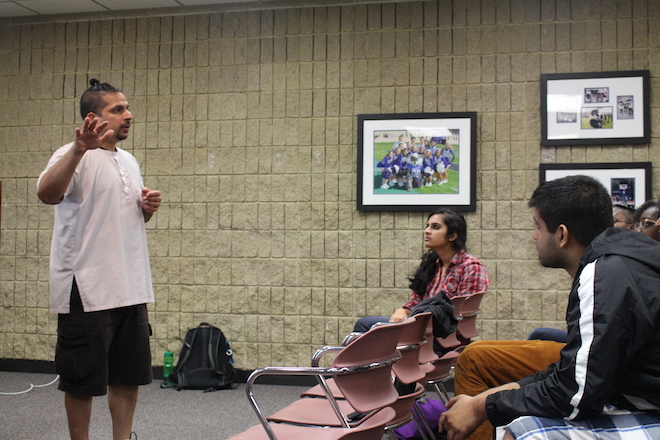
Dr. Adi Nadimpalli of Doctors Without Borders/Medecins Sans Frontieres stressed the principles of neutrality and independence when providing humanitarian aid to countries riddled with conflict in a talk titled ‘Medicine in the Midst of War’ hosted by Phi Delta Epsilon Illinois Gamma and MEDLIFE.
Nadimpalli, vice president of the MSF's US board of directors, spoke casually to a crowd of about 40 pre-med students about the current situation in Syria and the medical issues surrounding the struggle. Before working for MSF, Nadimpalli worked in New Orleans as a physician trained in internal medicine focused on pediatrics. As a member of MSF, Nadimpalli traveled to Liberia, Mozambique, Sri Lanka, Nigeria and Syria to offer medical services primarily in refugee camps.
In the conversation, Nadimpalli aimed to separate the militant forces of Syria from the “humanitarian component” of the organization, highlighting that there needs to be a “brick wall” between the two categories of aid.
“Humanitarian organizations shouldn’t be a wing of militaries,” Nadimpalli said. According to Nadimpalli, MSF works meticulously with state bodies to assure they are health professionals and are not aligned with the US government or other international organizations.
“We are there only to do medical care,” Nadimpalli said. “We hope that allows for legitimacy from populations, especially armed populations. When we can’t get that anymore, we leave.”
Nadimpalli also criticized organizations that depend on militants to bring aid actors to medical sites and ensured that “no arms are allowed into our facilities.” He described in further detail the medical issues within Syria. During times of war, the MSF representatives treated patients with chronic diseases, burns, respiratory, diarrheal and typhoid illnesses. Nadimpalli also highlighted the importance of orthopedics and vaccine related issues in the war trodden country of Syria.
“Vaccinations are a huge deal especially in a country like Syria who doesn’t have a functioning health structure,” Nadimpalli said.
Some audience members including Aditya Ghosh, Weinberg junior and President of PhiDE, were interested in the conflict and MSF’s approach to the humanitarian crisis.
“As pre-med students, we don’t get to hear too much about humanitarian efforts and global health,” Ghosh said.
Along with Ghosh, Weinberg freshman Emily Morris was glad to learn about the “different lifestyle” needed to practice medicine in a country other than America. “It was appealing to see how enthusiastic he was about it,” Morris said.
“What was most interesting was that MSF does have specific sites set up within Syria, however depending on the local or military climate, they might have to evacuate those sights,” Ghosh said.
Looking towards the future, Nadimpalli advises students to study abroad, learn languages and understand global politics. He emphasizes how it’s up to the doctors to follow through with empathy and passion when going abroad.
“There’s a lot of understanding that goes into this,” Nadimpalli said. “Going to war-torn areas is quite dangerous for young organizations.”